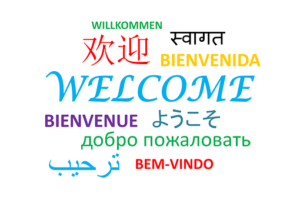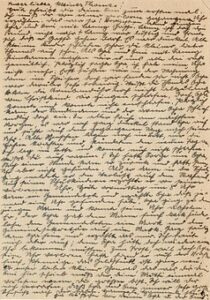Several months ago on this blog, I mentioned that I once taught a course in the history of the English language. One of my readers, Maggie, suggested I write something about the English language. I am following her suggestion.
 First, what is language? Language is a system of sounds (speech), gestures (sign language), or graphic symbols (writing) by which people communicate. Linguists estimate there are roughly 5,000 to 7,000 different languages in the world. The three languages with the most users are (in this order): Chinese, Spanish, and English.
First, what is language? Language is a system of sounds (speech), gestures (sign language), or graphic symbols (writing) by which people communicate. Linguists estimate there are roughly 5,000 to 7,000 different languages in the world. The three languages with the most users are (in this order): Chinese, Spanish, and English.
Language is powerful. It can bestow a group identity. Historically, various groups of people have had a language that so-called outsiders might not understand. Doctors, pilots, educators, gangs, filmmakers, deep-sea divers, farmers, carpenters, teenagers, and even nuns have their own jargon. Accent is interesting too. When I give talks and retreats in the East or South, I sometimes hear from a listener, “I love your Midwest accent.” Of course, I don’t think I have an accent! Language can also indicate “social stratification.” Remember how Eliza in My Fair Lady had to learn the “proper way” to say, “The rain in Spain falls mainly on the plain”?
Language is “a living thing”—unless it is a dead language, that is, a language no one speaks anymore. As such, language is always changing. Here is Matthew 8:20 from three different periods in the history of the English language:
Foxas habbao hol-u and heofonan fuglas nest. (Old English)
Foxis had dennes, and briddis of heuene had nestis. (Middle English)
Foxes have dens, and birds of the heaven have nests. (Modern English)
Remember, these are all English. So, if you were suddenly transported to 14th Century England, you would have a  hard time communicating! The Middle English version shows that hol-u became dennes and fuglas became briddis. Contemporary English still has the words hole, den, and birds. English also has a history of borrowing from other languages. Notice these “English” words: cookie (Dutch), cigar (Spanish) klutz (Yiddish), cartoon (Italian), loot (Hindi), kindergarten (German), karaoke (Japanese), gung-ho (Chinese), and coffee (Arabic.)
hard time communicating! The Middle English version shows that hol-u became dennes and fuglas became briddis. Contemporary English still has the words hole, den, and birds. English also has a history of borrowing from other languages. Notice these “English” words: cookie (Dutch), cigar (Spanish) klutz (Yiddish), cartoon (Italian), loot (Hindi), kindergarten (German), karaoke (Japanese), gung-ho (Chinese), and coffee (Arabic.)
If you live long enough, you become aware of some of the changes in the language you speak. In the word often, the “t” was originally silent. But then speakers began to pronounce the “t.” (Do you?) I imagine some day everyone will be pronouncing the “t.” Do you know the difference between lie (to recline) and lay (to put or place)? You lie down on the bed. You lay your keys on the table. How many people know that “rule” anymore? Just think how science and technology are changing the English language. In recent decades, thousands of new words have come into the language such as astronaut, earthrise, email, CD, google, podcast. And old words have taken on new or expanded meanings: the web, surf, gay, apple, text, cell. I’m wondering what effect text messaging is having on the English language, R U 2?
English, like many languages, is complex and often irrational—especially when it comes to spelling. In 1828 Noah Webster wrote the first dictionary of American English. It took him 26 years—and he first learned 28 languages! Webster tried to standardize the spelling of American English. In doing so, he often simplified spelling  too. So today Americans write color and center while Brits write colour and centre. Some of his changes in spelling, however, never caught on. For island he suggested iland and for tongue, tung. But one of his major contributions was this: he added two letters to our alphabet: j and v. Prior to Webster, these two letters had been listed merely as alternative forms of i and u. (The Latin inscription on the crucifix is INRI–which stands for Jesus of Nazareth Rex (King) of the Jews. Latin has no j.) Webster gave j and v their own sections in his dictionary. (Try singing the alphabet song without j and v.)
too. So today Americans write color and center while Brits write colour and centre. Some of his changes in spelling, however, never caught on. For island he suggested iland and for tongue, tung. But one of his major contributions was this: he added two letters to our alphabet: j and v. Prior to Webster, these two letters had been listed merely as alternative forms of i and u. (The Latin inscription on the crucifix is INRI–which stands for Jesus of Nazareth Rex (King) of the Jews. Latin has no j.) Webster gave j and v their own sections in his dictionary. (Try singing the alphabet song without j and v.)
There’s so much more to say about language. For example, what role do stress, pitch, and juncture play in communicating? Or what about the power of words to heal, hurt, or start wars? And is being “politically correct” really a new thing? Also what about the language of animals? In future blogs, I hope to explore some of these topics.
What have been some of your blessings and struggles with language?
Do you know another language besides your first language? If so, when did you learn it? What was that experience like for you?
When do you most experience the power, beauty, and mystery of language?
Let us conclude this reflection with a short prayer: Ever-communicating God, I thank you for the wonderful gift of language. May I use this precious gift to join together and not divide, to build up and not tear down, to speak truth and not spread falsehoods. May I grow in my ability both to express myself and to listen to others. I ask for these graces through Jesus, the Word of God, and his Amazing Spirit. Amen.
Announcing Our Winners! Last week I promised to give away a copy of my little book, The Lord Is My Shepherd, to one person who responded in any way to last week’s blog, “How Much Can You Say in Six Words.” I had over 150 responses last week—the most ever! So I decided to give away TWO books. (Aren’t I a nice lady?) So I put all the names in a basket and had Sisters John Paul and Sandy (with whom I live) draw the lucky winners. And the winners are…(drum roll please!)… Rita Maglio and Ilene Renshaw! Rita, mother of 9 and grandmother of 19, hails from Merrimack, NH. She and her 5 sisters made a retreat I gave in St. Petersburg, FL a few years back. Ilene is from Pennington, NJ. She and her husband met me several years ago at a retreat I gave in her area. She’s happy to get the book because Ps. 23 was her father’s favorite psalm. So congratulations, Rita and Ilene! An autographed copy of my book is on its way to you! And thanks to all who responded last week with so many six-word gems!
What language do we use to communicate with God? One day the disciples of Jesus asked him to teach them to pray. Jesus proceeded to gave them a few words (Luke’s version has only 38 words in English, Matthew’s version, 52.) These words have become for millions of people the most powerful and meaningful of all prayers. Here is Andre Bocelli’s beautiful version of the Our Father…
Do you have any comment on this reflection or the song? We’d love to see your words below!

24 Responses
Language for me is joy. Agony sometimes but mostly joy.
Dylan Thomas. Who can read him and remain unaffected?
Poetry. Among the living, Mary Oliver, Ted Kooser, my New England Poetry Club workshop mates, and my friend Elena, all have produced language that helps me live.
The language of liturgy. I love going to Mass and hearing languages other than English sometimes. Visiting synagogue and hearing sung Hebrew. Silences between words. The chiseled English of old prayerbooks (e g the 1928 Book of Common Prayer of the Episcopal church).
Social stratification. I used to have a wicked Bawstin accent! I still sound New Englandish, I suppose. But my terminal Rs are more frequent!
I can become obsessive about language. Note my refusal to say “obsessing over”! But I have a friend in his 90s who can be particular about the finer points. “Averse from” is proper, he’ll urge, not “averse to.” And so on.
Yes, language can wound and exclude. It can also heal, bless, thrill, exalt, and unite. And sometimes even do cartwheels and contortions!
Therefore, since brevity….thanks for this post, Sister! Wonderful topic!
My Spanish 101 instructor told us initially that we would love learning
Espanole as it is claro, facil, e logico!! And it was and English is exactly
the opposite of the above!